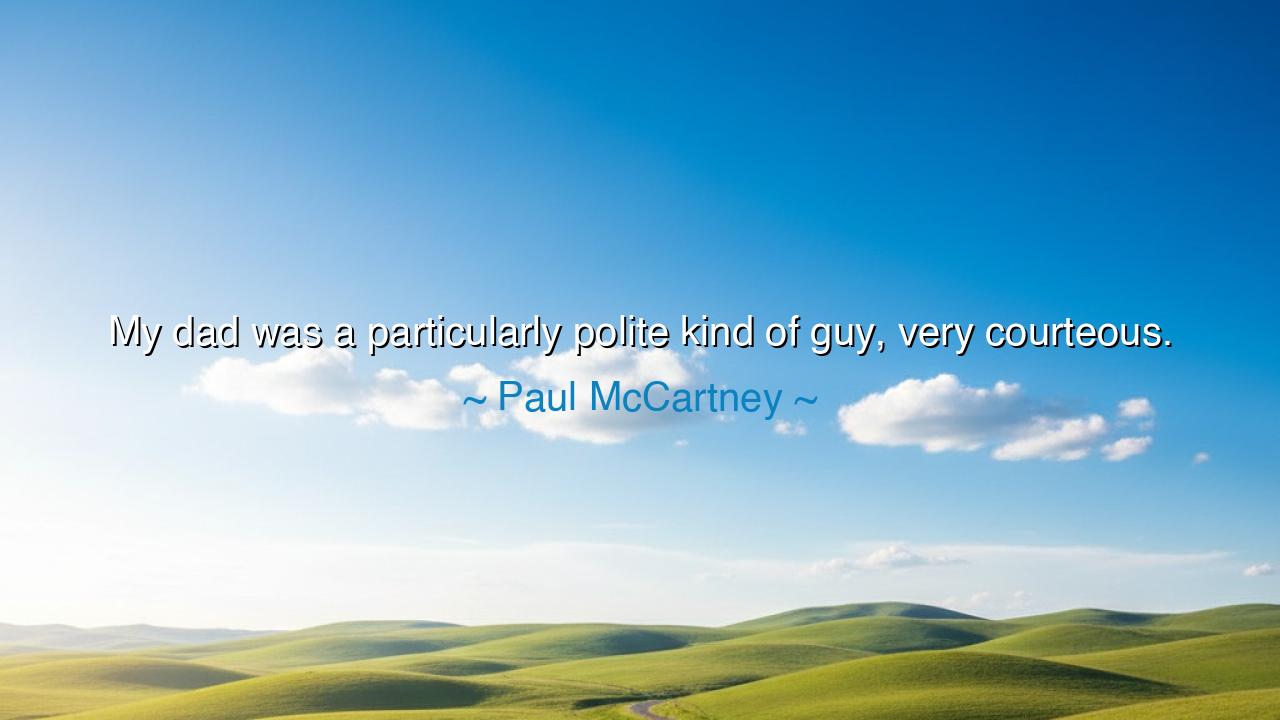
My dad was a particularly polite kind of guy, very courteous.






The words “My dad was a particularly polite kind of guy, very courteous,” spoken by Paul McCartney, shine not merely as a recollection of family, but as a tribute to an ancient and vanishing virtue — courtesy, the art of gentleness, dignity, and grace in human dealings. Beneath their simplicity lies a deep current of wisdom: that greatness does not arise only from genius or strength, but from character, and that the roots of kindness, once planted in the home, can reach the farthest corners of the earth. McCartney, one of the world’s most celebrated artists, speaks here not of fame, but of the quiet influence of his father — a man who taught through example that politeness is not weakness, but harmony made visible.
In calling his father “a polite kind of guy,” McCartney reveals that courtesy was not a performance, but a way of being — a discipline of the heart. True politeness is not born of rules, but of respect; it is the outward form of inward compassion. The ancients saw courtesy as the foundation of civilization, for it transforms instinct into intention, and selfishness into consideration. It is what tempers the tongue, restrains the hand, and elevates the spirit. In an age increasingly loud and hurried, McCartney’s words remind us of a timeless truth: that manners are not trivial gestures, but acts of peace, small bridges built between souls.
His father, James McCartney, was a working-class man from Liverpool, a musician and dreamer who lived through war and hardship. Yet even in scarcity, he carried himself with grace and composure. This is the quiet nobility Paul speaks of — the strength that does not boast, the dignity that does not demand attention. In this sense, his father’s politeness was a form of artistry, as deliberate and meaningful as music. It taught young Paul that one’s demeanor toward others is a melody of its own — one that can soothe, inspire, or unite. From that early example of humility and respect, McCartney learned not only how to write songs that touched the heart, but how to live in harmony with others — fame without arrogance, success without cruelty.
This virtue of courtesy has deep roots in the ancient world. The knights of old Europe held it as the soul of chivalry — to be strong yet gentle, powerful yet kind. In Japan, the samurai practiced rei, the art of respectful conduct, believing that how one bows or speaks reveals the order of one’s spirit. Even in the teachings of Confucius, li — the principle of proper behavior — was not about obedience, but about cultivating peace between people. In all these traditions, the message was the same: courtesy is the beginning of wisdom, for it requires self-control, empathy, and awareness of others. To be courteous is to see beyond oneself — and in that seeing, to touch something divine.
There is a story of Abraham Lincoln, who during the American Civil War was criticized for being too kind, too patient, too polite even toward his enemies. One of his advisors said, “You must destroy them, not befriend them!” Lincoln replied, “Do I not destroy my enemies when I make them my friends?” His politeness was not softness, but moral courage — the refusal to let anger consume his humanity. In the same way, Paul McCartney’s father modeled a strength that wears no armor, a dignity that rises from respect rather than domination. Such examples remind us that the truest strength is gentle, and that civility is not the mark of weakness, but of mastery.
When McCartney speaks of his father’s courtesy, he also speaks of inheritance — not of wealth, but of wisdom. What a father plants in the soil of his child’s heart grows quietly through the years, shaping their every word and gesture. The father who says “thank you,” “please,” and “after you” does more than teach manners; he teaches reverence for the humanity in others. The son who learns such lessons carries them into the world, turning private virtue into public grace. In this way, Paul McCartney’s global influence — his ability to bring joy, connection, and beauty to millions — may trace its origins to a single, polite man in Liverpool, who showed that decency is itself a form of art.
So, my children, take this to heart: be courteous, even when the world forgets to be. Politeness costs nothing, but enriches all it touches. It disarms anger, heals division, and restores dignity to human exchange. In every age, the loud will seem powerful, but the polite will endure — for their strength lies not in volume, but in virtue. Walk gently, speak kindly, and remember that even in a world of noise and pride, there is no greatness like grace, and no inheritance so lasting as a courteous heart.






AAdministratorAdministrator
Welcome, honored guests. Please leave a comment, we will respond soon